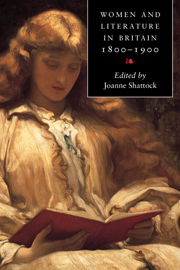Book contents
- Frontmatter
- Contents
- List of contributors
- Acknowledgments
- Chronology
- Introduction
- 1 The construction of the woman writer
- 2 Remaking the canon
- 3 Women and the consumption of print
- 4 Women writing woman: nineteenth-century representations of gender and sexuality
- 5 Feminism, journalism and public debate
- 6 Women's writing and the domestic sphere
- 7 Women, fiction and the marketplace
- 8 Women poets and the challenge of genre
- 9 Women and the theatre
- 10 Women writers and self-writing
- 11 The professionalization of women's writing: extending the canon
- 12 Women writers and religion
- 13 Women writing for children
- Guide to further reading
- Index
5 - Feminism, journalism and public debate
Published online by Cambridge University Press: 03 October 2009
- Frontmatter
- Contents
- List of contributors
- Acknowledgments
- Chronology
- Introduction
- 1 The construction of the woman writer
- 2 Remaking the canon
- 3 Women and the consumption of print
- 4 Women writing woman: nineteenth-century representations of gender and sexuality
- 5 Feminism, journalism and public debate
- 6 Women's writing and the domestic sphere
- 7 Women, fiction and the marketplace
- 8 Women poets and the challenge of genre
- 9 Women and the theatre
- 10 Women writers and self-writing
- 11 The professionalization of women's writing: extending the canon
- 12 Women writers and religion
- 13 Women writing for children
- Guide to further reading
- Index
Summary
The extensive involvement of women writers in public debate throughout the nineteenth century has rarely been recognized, despite the fact that they addressed almost every imaginable social and political subject. In part, this is the result of a lack of any adequate language with which to describe or analyse either women's non-fictional writings or those who produced them. There were certainly lady novelists in the nineteenth century, but no terms emerged to describe women essayists or historians or journalists – and there was no broad recognition of the ‘woman of letters’. The expansion of publishing in the late eighteenth and the nineteenth centuries, like the rise of the periodical press and the emergence of journalism as an acceptable middle-class profession, provided opportunities for women as well as for men, and significant numbers of women wrote and published pamphlets, tracts and books as well as literary reviews and essays. But, as Mary Poovey and Judith Johnston have argued, the very term ‘man of letters’, which accompanied and even celebrated the rise of a new kind of writer, and the range of new forms of writing available to men, served quite explicitly to mask the rise of the woman of letters, and to render problematic the general category of the woman writer.
Even when some of the ideas of women writers are acknowledged, in the many recent anthologies exploring nineteenth-century feminism, for example, there is little recognition of how extensive women's writings were even on these questions or of the important role that the ‘woman question’ played in giving women a voice in public debate.
- Type
- Chapter
- Information
- Women and Literature in Britain 1800–1900 , pp. 99 - 118Publisher: Cambridge University PressPrint publication year: 2001
- 1
- Cited by



